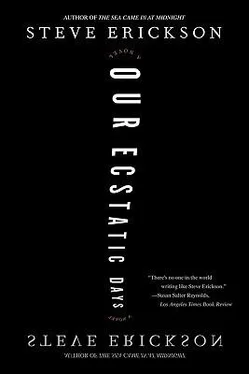to my knees I moaned for him to come back come back come back, dropping to
else in the hotel except Barbrasita the Navajo girl who delivers meals and cleans the rooms and mops the wide black-oak hallways, and Rollin the other guest three rooms down.
Moving from city to city selling shady weather reports until stranded by a west-bound train a few weeks before, Rollin is a traveling meteorologist in his mid-fifties. Soon after Brontë and Lulu’s arrival he takes to rapping on their door day and night, posting himself there for hours on end, chatting up the younger woman. He’s too unabashedly stupefied by her breasts to even pretend interest in anything else about her. If his knock goes unanswered, he invites himself in regardless. Ceaselessly he recounts the itinerary of his life and expounds with great expertise on the caprice of lightning, talking about anything and everything except — as Wanda dryly points out — his wife and daughter back in St. Louis. Bronte finds him too ridiculous to be threatening, but when he accosts her one night in a darkened corridor, she can’t help wondering where’s a whip and a good pair of handcuffs when a girl needs them. As the nights go by, the moody Barbrasita who Brontë saw slipping into Rollin’s room the first night becomes more sullen, lingering outside his door to less and less attention, as the music of a radio can be plainly heard on the other side.
Whenever she sees Brontë, Barbrasita’s expression grows darker. Delivering dinner from the kitchen downstairs, she practically hurls it in the other’s face, and when she refuses to help change Lulu’s bed a week later, the two young women have a blistering bilingual argument in the hallway that neither understands. “I think,” Bronte finally tries to confront things head-on, “perhaps you’ve the wrong idea about me and your weatherman—” to which Barbrasita grabs the soup spoon from a meal tray and lunges at the other woman to scoop out her eyes, before Wanda pulls
my knees I retracted every stern admonition I had already given him, I scooped
her away. Walking the hotel corridors at night, Brontë takes to rounding darkened corners at a wide arc in anticipation of ambush. When she’s not waking to the sound of trains, it’s to the expectation of the Indian girl standing over her, lethal spoon in hand. Somehow Rollin is oblivious to all this. He assumes everyone basks in his bonhomie. Day after day then week after week, as Barbrasita lurks outside his room, he lurks outside Brontë’s, telling again and again the same stories he’s told before, each time embellishing wildly as though no one ever would notice the variance with earlier versions. Sometimes Bronte thinks he’s forgotten about seduction altogether, so satisfied is he by his own regalement. It occurs to her to set him straight on her preferences but she’s got the feeling Rollin would just find further inspiration in ever preposterous reveries of the two women in all their possible permutations.
A couple of weeks stretch into a couple more. Only after Brontë and Lulu have been at the pueblo almost a month does Rollin — peviously in no great hurry to leave a hotel so conveniently remote and teeming with comely Indian maidens and pneumatic golden-haired pixies — suddenly become very anxious himself about the next train. For several nights Brontë hears the sound of terrible fights coming from his room. Whatever Barbrasita is saying, Rollin seems to understand very well.
One afternoon Brontë sees from her window a distant car, snubbed and blunted like a discharged bullet, weaving its way toward the pueblo through the storm, daring the lightning to take it out. Driving in thirty miles from the northeast, a family of four has come for the train. When dark falls they roam the lobby waiting, an older man and woman and a younger man who dozes on one of the wooden monastery benches strewn throughout the foyer, and a
him up in a puddle and held him in the cup of my hands just as I did up there a
boy of about eleven who plays games on an ancient laptop. It’s not clear to Brontë how the four are related. “Here to bury her son,” the old man shrugs at the woman sitting quietly alone, “killed in the fighting up in Zion. Going back home now,” but not east it turns out, rather back the way Bronte and Lulu came. Graying hair pulled back, the woman sits on her bench for hours saying nothing,staring ahead of her and only lifting her eyes and nodding slightly whenever the old man whispers to her. She never settles into the bench, rather she sits at the edge in anticipation of something she’s already too late for, as though so flabbergasted by her grief she doesn’t feel it, as though distilled in this moment is the tenor of her entire life. For a while Brontë waits up to see with her own eyes if a train actually rolls through, heading any direction.
Finally around midnight she goes back up to her room where, after cooling Lulu’s fevered brow with a damp cloth, she sleeps.
She’s awakened by yet another argument between Rollin and Barbrasita. This is by far the most violent she’s heard, coming not from the room just a few doors away but downstairs. From the darkened landing of the stairs she can see Barbrasita below with a furious grip on Rollin’s arm, pulling him from the family that, apparently, has given up on the train and now means to drive back through the storm and the night; over her screams, desperately Rollin beseeches them to take him. The family seems stricken. Somewhere Roy and Wanda hide beneath their covers. Finally shaking themselves free of their bereaved inertia, the older man and woman, the young man and the boy dash madly for the bullet car; and confronted with the choice of the storm before him or Barbrasita behind him, Rollin bolts in pursuit past the same adobe porticos through which the great great grandson of the San Sebastian aristocrat vanished almost a century ago — as though
few minutes ago on the lake, or down there, whichever way the lake is now, in
he thinks he can charm the lightning.
In the following weeks, Barbrasita watches from the pueblo’s front window for signs of how far Rollin got — but out here, Wanda tells Brontë, even the vultures don’t fly. Soon the Navajo girl gives up her vigil and instead takes to sitting every day for hours on a stark high-back chair in the hallway outside Brontë’s door, not unlike the way the woman who lost her son in the fighting up in Zion sat all night on the bench downstairs. With no rooms other than Brontë’s and Lulu’s to make up, no other clean towels to be delivered, no other lunches or dinners to be served, she stares at her growing belly and rains on it the same black curses she rained on the child’s father the night he left. Sitting at her own window staring out at the desert stonehenge of railway cars surrounding the pueblo, Brontë realizes she no longer knows for sure whether she’s waiting for a train or for the woman in the bed to die; on the frontier of a kind of catalepsy, from time to time Lulu arouses herself to an uncognitive waking, drinking and eating only enough to endure but never to speak or, as far as Bronte can tell, truly know. Brontë herself cannot know, for instance, that, beyond the windows, Lulu sees — as no one else sees — the melody-snakes crawling up out of the parched dust long enough to rattle a few notes before lightning cuts short their songs in a throttled shriek. Female screams fill the charged air. Lulu hears them even as she slips back to sleep, the way Bronte hears trains.
Brontë has no idea why it’s important to get to Chicago. Actuallyshe doesn’t think it’s important at all, Chicago’s just the place the train happens to go to. She doesn’t really suppose it will make any difference to Lulu. But this hotel seems to her an intolerable placefor someone to die — better the Chateau. On the pay phone downstairs, she tra cks down a doctor in the territory who drives in
Читать дальше











